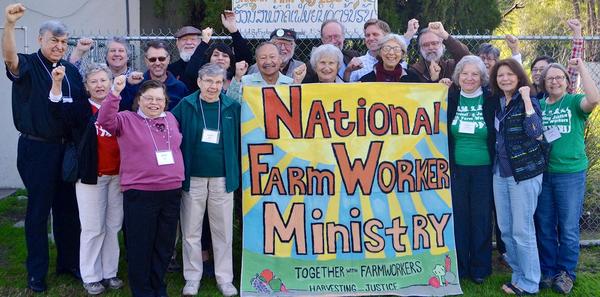Join Loretto and the LACC in participating in the 2023 Harvest of Justice campaign
Posted on September 6, 2023, by Loretto Community
Loretto’s Latin America and Caribbean Committee (LACC) would like to share National Farm Worker Ministry’s annual Harvest of Justice over the next 6 weeks from Sept. 6 (Labor Day) to Oct. 16 (World Food Day). Loretto and LACC have been part of the farm worker movement and National Farm Worker Ministry for over 50 years. As part of our support of the NFWM work, we share these education materials and action opportunities on the topic of Farm Workers and Racism.
Farm Workers & Racism: The Struggle for Justice, Respect & Fair Pay
The 2023 Harvest of Justice campaign is an educational program that features interviews with farm workers and organizers addressing the many ways racism impacts the daily lives of farm workers. The goal of the program is to raise consciousness and encourage us to take action alongside workers.
Weekly resources are listed below and will be sent out weekly in the Midweek Mission Message. You are encouraged to read, share and take ACTION using these NFWM resources about farm workers and racism.

File photo
Harvest of Justice, Week 1 – Farm Workers & Racism: The Struggle for Justice, Respect & Fair Pay
Download Introduction to Farm Workers & Racism (Introducción a los campesinos y el racismo) to read an overview of the topic, including discussion questions.
Watch our bilingual video “Farm Workers & Racism: The Struggle for Justice, Respect & Fair Pay” to hear directly from farm workers.
Take Action:
Support farm worker-led campaigns and initiatives across the country.

File photo
Harvest of Justice, Week 2 – A History of Racism in Agriculture
Starting from the indentured servants from Europe who were recruited as cheap labor to help care for the land to the first African enslaved persons brought to Virginia in 1619, the United States’ agricultural system is deeply rooted in exploitation and racist policies. Learn more by exploring Condensed Agricultural Timeline in the U.S. (Cronología de la agricultura).
Take Action:
Tell Congress to pass the Fairness for Farm Workers Act. The bill would amend the Fair Labor Standards Act of 1938 to provide overtime and additional minimum wage protections for farm workers. Use these Talking Points to help craft your communication to your legislator.
Discussion Questions:
What are some of the reasons lawmakers give for why farm workers still need to be exempt from overtime pay and other labor laws? Are these reasons justifiable? The majority of farm workers are people of color, but the most common ethnicity among farm managers is White. What steps need to be taken for managerial positions to be more equitable?
Harvest of Justice, Week 3 – Environmental Racism

File photo
Environmental racism is the disproportionate impact of environmental hazards on people of color. From temperature changes to natural disasters, farm workers are on the front lines of climate change. Farm workers are also at a disproportionate risk from exposure to pesticides, which can cause short- and long-term illnesses for workers and their families. Although farm workers are often recognized as an environmental justice community, the U.S. government’s regulations and policies offer workers little to no protections against environmental hazards. Read more about this week’s topic in Environmental Racism Handout (Racismo Ambiental).
Take Action:
Contact your legislators and urge them to stand with farm workers and their families by passing the Banning All Neurotoxic Organophosphate Pesticides from our Food Act (The BAN OPs Act). Use this BAN OPs Fact Sheet and email copy to help create a personalized letter/email to your legislator.
Discussion Questions:
How do environmental issues disproportionately impact communities of color? How can we work towards environmental justice for all communities? What environmental injustices exist in your community and/or state?
Harvest of Justice, Week 4 – Modern Slavery
In some cases, farm workers experience physical and psychological abuse in the fields. In the worst cases they live in modern day slavery conditions. Read Modern Day Slavery Handout (La Esclavitud Moderna) to learn more. Please also watch our short bilingual video of two CIW staff members discussing their anti-slavery program and cases of modern day slavery within the U.S.
Take Action:
Boycott Wendy’s fast food chain until they sign on to CIW’s Fair Food Program.
Discussion Questions:
Why is modern slavery prevalent in agriculture? What steps need to be taken for modern slavery to be eliminated from our food chain? What organizations are working to combat modern slavery and how can consumers join in their efforts?

File photo
Harvest of Justice, Week 5 – Celebrate BIPOC Farmers
Farmers of color make up less than 5% of all U.S. farmers. In 1920, Black farmers made up 14% of all farmers. It is estimated that Black farmers lost around $326 billion worth of land within the 20th century. While farming is hard work and it isn’t uncommon for farmers to leave the profession, that does not account for this staggering loss of land. Much of this loss is due to discriminatory practices from the United States Department of Agriculture and other unjust dealings around heirs’ property. We encourage you to educate yourself more about how a long-history of loan denials as well as violence and intimidation lead to farmers of color being forced off their land. Explore HOJ 2023 Farmers of Color Resources to learn more and connect with organizations serving farmers of color.
Take Action:
Tell your legislators to support the Justice for Black Farmers Act and Increasing Land Access, Security, and Opportunities Act.
Discussion Questions:
How did farm owner become one of the top five whitest professions in this country? What is land hunger and how does lack of access to land hurt communities? How can people of faith and conscience better support farmers of color?
